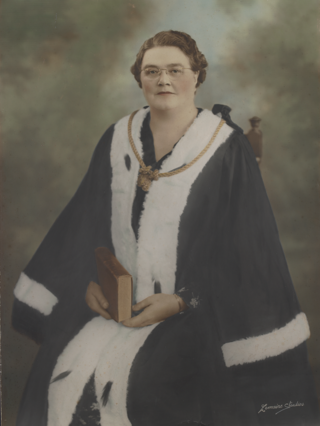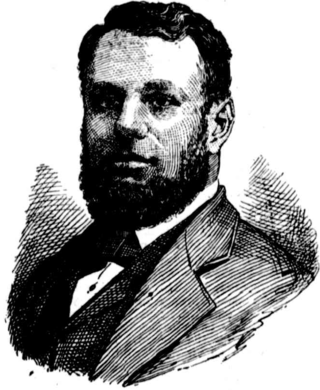Related Research Articles
Cumberland (South Riding) was an electoral district of the Legislative Assembly in the Australian state of New South Wales from 1856 to 1859, in the rural part of Cumberland County, which includes Sydney. It included all of the county south of Parramatta Road and the Great Western Highway, except for the urban electorates of Sydney (City), Sydney Hamlets, Parramatta and Cumberland Boroughs, which included Liverpool and Campbelltown. It elected two members simultaneously, with voters casting two votes and the first two candidates being elected.

Elizabeth Lilian Maud Fowler MBE, JP was an Australian politician. She was Australia's first female mayor, serving as mayor of Newtown, New South Wales, from 1937 to 1939. She later represented the seat of Newtown in the New South Wales Legislative Assembly from 1944 to 1950. She had a long involvement with the Lang Labor faction of the Australian Labor Party (ALP), which had evolved into a separate party by the time of her election to Parliament.
Members of the New South Wales Legislative Assembly who served in the eighth parliament of New South Wales held their seats from 1874 to 1877. The 1874–75 election was held between 8 December 1874 and 12 January 1875 with parliament first meeting on 27 January 1875. There were 72 members elected for 52 single member electorates, 6 two member electorates and 2 four member electorates. During this parliament the number of graduates of Sydney University exceeded 100 and the seat of University of Sydney was created. The maximum term of this parliament was 3 years and the assembly was dissolved after 34 months. Premiers during this parliament were Sir John Robertson 9 February 1875 till 22 March 1877 and from 17 August 1877 and Sir Henry Parkes 22 March 1877 till 17 August 1877. The Speaker was William Arnold until his death on 1 March 1875 and then George Allen.
Members of the New South Wales Legislative Assembly who served in the 11th parliament of New South Wales held their seats from 1882 to 1885. Elections for the eleventh Legislative Assembly were held between 30 November and 21 December 1882 with parliament first meeting on 3 January 1883. The Assembly was expanded to 113 members elected in 40 single member electorates, 26 two member electorates, 3 three member electorate and 3 four member electorates. The parliament had a maximum term of 3 years and was dissolved on 7 October 1885 after 33 months. The Premiers during this parliament were Sir Alexander Stuart until 7 October 1885 and then George Dibbs. The Speaker was Edmund Barton.

David Buchanan was a barrister and politician in colonial New South Wales, a member of the New South Wales Legislative Assembly and later, the New South Wales Legislative Council.

Jacob Garrard was a politician in colonial New South Wales, serving as Secretary for Public Works and Minister of Public Instruction.

Sir John Lackey was a magistrate and politician in colonial New South Wales, President of the New South Wales Legislative Council 1892 to 1903.
George McCredie was an Australian politician.

Andrew Hardie McCulloch was an Australian solicitor and politician.
The 1848 New South Wales colonial election was held between 29 July and 2 August. No candidates were nominated for Port Phillip as a result of the campaign for independence from New South Wales, and a fresh writ was issued for an election on 3 October.
Cumberland South Riding, an electoral district of the Legislative Assembly in the Australian state of New South Wales was created in 1856 and abolished in 1859.
A by-election was held for the New South Wales Legislative Assembly electorate of Newtown on 12 July 1861 because of the resignation of Alexander McArthur who had been appointed to the Legislative Council.
Central Cumberland, an electoral district of the Legislative Assembly in the Australian state of New South Wales was created in 1859 and abolished in 1894.
A by-election was held for the New South Wales Legislative Assembly electorate of Central Cumberland on 6 June 1863 because of the resignation of James Atkinson due to insolvency, who then re-contested the seat.
A by-election was held for the New South Wales Legislative Assembly electorate of Central Cumberland on 17 December 1868 because of the resignation of Allan Macpherson, who left the colony to return to Europe.
A by-election was held for the New South Wales Legislative Assembly electorate of Central Cumberland on 24 December 1887 because of the resignation of Andrew McCulloch due to insolvency, having assigned his estate for the benefit of his creditors.
A by-election was held for the New South Wales Legislative Assembly electorate of Central Cumberland on 14 March 1888 because of the resignation of Varney Parkes.
A by-election was held for the New South Wales Legislative Assembly electorate of Central Cumberland on 22 June 1889 because of the death of John Linsley.
A by-election was held for the New South Wales Legislative Assembly electorate of Central Cumberland on 28 September 1889 because of the resignation of Frank Farnell due to bankruptcy.
A by-election was held for the New South Wales Legislative Assembly electorate of Central Cumberland on 6 May 1893 because of the resignation of John Nobbs due to bankruptcy.
References
- 1 2 "Mr Andrew Hardie McCulloch (junior)". Former members of the Parliament of New South Wales . Retrieved 12 April 2019.
- ↑ A H McCulloch (7 May 1888). "Central Cumberland election". The Sydney Morning Herald . p. 2. Retrieved 25 August 2020– via Trove.
- ↑ "Central Cumberland election". The Cumberland Mercury . 9 May 1888. p. 2. Retrieved 25 August 2020– via Trove.
- ↑ "Writ of election: Central Cumberland". New South Wales Government Gazette . No. 280. 2 May 1888. p. 3133. Retrieved 25 August 2020– via Trove.
- ↑ Green, Antony. "May 1888 Central Cumberland by-election". New South Wales Election Results 1856-2007. Parliament of New South Wales . Retrieved 25 August 2020.